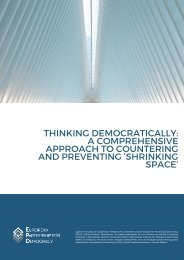Repression and resilience: Diagnosing closing space mid-pandemic
Create successful ePaper yourself
Turn your PDF publications into a flip-book with our unique Google optimized e-Paper software.
32 REPRESSION AND RESILIENCE: DIAGNOSING CLOSING SPACE MID-PANDEMIC<br />
will have been exp<strong>and</strong>ed, providing autocrats with<br />
an exp<strong>and</strong>ed toolbox for repression. By rebuilding a<br />
problematic status quo for women, minorities <strong>and</strong><br />
disadvantaged populations, the post-p<strong>and</strong>emic order will<br />
continue to systematically exclude certain populations<br />
from decision-making, reinforcing an unequal socioeconomic<br />
system.<br />
For other countries, the p<strong>and</strong>emic may be the stepping<br />
stone for a whole new era of autocratisation. As global<br />
outbursts will continue to trigger periods of restrictions,<br />
states of emergency <strong>and</strong> restrictions will eventually<br />
become the norm in some countries. The increased police<br />
violence <strong>and</strong> militarisation legitimated by the p<strong>and</strong>emic,<br />
will remain in place to enforce the lockdowns <strong>and</strong> other<br />
restrictive measures, <strong>and</strong> ultimately police democratic<br />
<strong>space</strong>. Restrictions to fundamental freedoms that were<br />
unimaginable before will become the go-to solution for<br />
ruling parties facing a challenge to their authority.<br />
But some countries will build back better, driven by a<br />
new widespread appreciation of fundamental freedoms<br />
<strong>and</strong> rights following extended lockdowns. Heeding<br />
calls from civil society to make decision-making<br />
more inclusive <strong>and</strong> accountable, local <strong>and</strong> national<br />
governments may seize the opportunities of their own<br />
digitalisation, to adopt more transparent procedures<br />
<strong>and</strong> methods for citizen participation. By placing those<br />
most affected by the p<strong>and</strong>emic at the decision-making<br />
table, national socio-economic recovery plans will go<br />
beyond b<strong>and</strong>-aids, to redress the systemic inequalities<br />
in public policies, ranging from health care insurance<br />
to economic stimuli. As governments demonstrate their<br />
ability to tackle tremendous challenges quickly, their<br />
increased legitimacy <strong>and</strong> trust from citizens will boost<br />
their confidence <strong>and</strong> willingness to take on other complex<br />
issues such as inequality <strong>and</strong> climate change. ‘Building<br />
back better’ would then mean building an inclusive <strong>space</strong><br />
for political competition <strong>and</strong> cooperation, ultimately<br />
exp<strong>and</strong>ing democratic <strong>space</strong>.

















